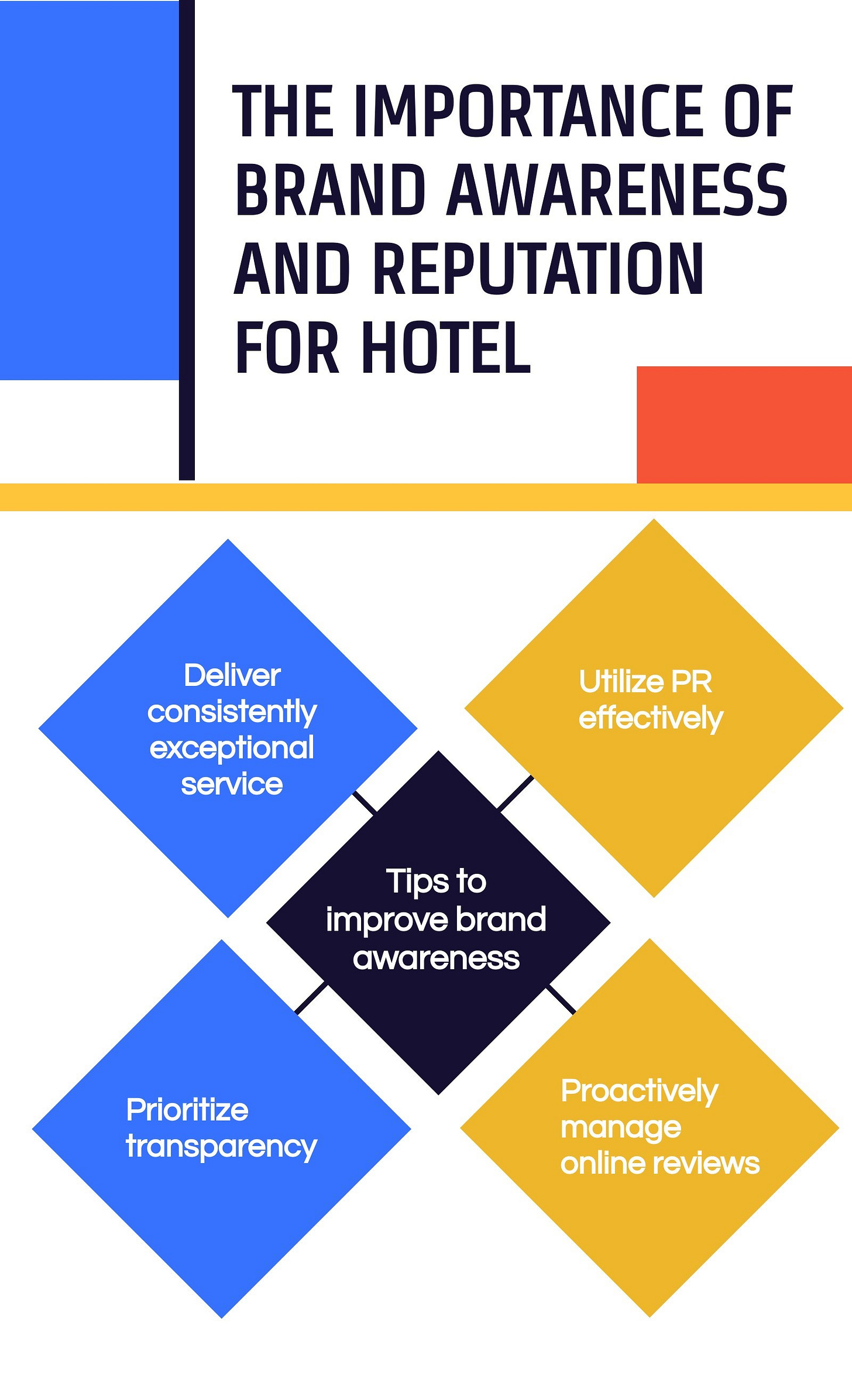The importance of brand awareness and reputation for Hotels
In the hospitality industry, brand awareness and reputation are intangible yet critical assets that can differentiate a thriving hotel from one that struggles.
In the hospitality industry, brand awareness and reputation are intangible yet critical assets that can differentiate a thriving hotel from one that struggles. Modern travelers no longer seek just a place to stay; they look for memorable experiences and exceptional services that reflect the reliability and prestige of the brand they choose. This article explores why these metrics are vital, how to enhance them, the best tools to analyze them, and what hotels can learn from other industries to elevate their branding strategies.
Why are brand awareness and reputation critical for Hotels?
Influence on booking decisions
According to recent studies, 89% of luxury travelers are more likely to book a hotel they are already familiar with. Brand awareness serves as the first step in a traveler’s decision-making journey. A recognized and trusted brand reduces perceived risks and creates an emotional connection that inspires loyalty.
Reputation drives revenue
A strong reputation not only influences customer acquisition but also increases pricing power. Travelers are willing to pay premium prices for brands they trust to deliver quality experiences.
Differentiation in a saturated market
In a crowded hospitality market, where online travel agencies (OTAs) dominate, a strong brand allows hotels to stand out, reducing dependence on third-party platforms and fostering direct bookings.
Actionable tips and examples to improve brand Awareness for Hotels
Improving brand awareness requires a combination of creativity, consistency, and leveraging the right tools and strategies. Below are actionable steps with real-world examples tailored for hotels:
1. Leverage storytelling and content marketing
Create destination-focused content: Write blogs or create videos about local attractions, unique dining spots, or cultural activities near your property. Make your hotel synonymous with the destination (content localization is a must)
Highlight guest stories: Share testimonials or create video montages featuring guests enjoying your amenities and experiences.
Promote unique features: If your hotel has a special architectural style, historical background, or eco-friendly practices, highlight these to differentiate your brand.
Example:
Marriott Bonvoy Stories: Marriott uses storytelling to highlight travelers' unique journeys, showcasing how their properties enhance the travel experience.
Donald Millers Storyboard framework is a great starting point:
Let’s see an example:
1. A character
Who is your customer, and what do they want?
Your guest is a traveler seeking a much-needed escape. They desire relaxation, rejuvenation, and memorable experiences that allow them to reconnect with themselves and their loved ones.
Example:
"Meet Sarah, a busy professional who hasn’t had a real break in years. She dreams of a place where she can unwind, enjoy nature, and create unforgettable memories."
2. Has a problem
What is getting in the way of what they want?
External problem: Stress from work, lack of time, or difficulty choosing a destination that meets their expectations.
Internal poblem: A feeling of being overwhelmed and disconnected from what matters.
Philosophical problem: “Everyone deserves a place where they can truly relax and feel cared for.”
Example:
"Sarah struggles to find a destination that promises true relaxation and meets her high expectations for comfort and quality."
3. Meets a guide
How do you position your resort as the solution?
You are the guide who understands their challenges and offers the perfect solution. Your resort provides personalized experiences, luxurious accommodations, and attentive service.
Positioning statemets
"We understand how hard it is to find time for yourself. That’s why our resort is designed to be your sanctuary—a place where you can recharge, reconnect, and indulge."
4. Who gives them a plan
What clear steps can they take to solve their problem?
Discover: Browse our website to explore our offerings and reviews.
Choose: Select the perfect accommodation package for your needs.
Relax: Book your stay and let us take care of the rest.
Example:
"Visit our website, choose your dream package, and prepare to relax. From the moment you arrive, we’ll handle everything so you can focus on what matters."
5. And calls them to action
What direct steps should they take to engage with your resort?
Direct CTA: "Book your stay today and escape to paradise."
Transitional CTA: "Download our free guide: '5 ways to maximize your next vacation' to start planning your escape."
7. And ends in success
What transformation will they experience?
Your guest will leave your resort feeling refreshed, reconnected, and inspired by unforgettable experiences.
Example:
"Sarah returns home feeling recharged, with cherished memories of her stay. She’s ready to take on the world again, knowing she’s found her go-to escape for the future."
Powered by: Yoourney
Discover the heart of your destination with Yoorney! 🌍
Explore cities worldwide with passionate local guides. Join a free tour today and experience travel like never before.
Book Now – Adventure Awaits!"
2. Invest in local partnerships
Collaborate with local businesses: Partner with local restaurants, tour operators, or artisans to create exclusive packages for guests (encourage them to promote it on social media)
Sponsor community events: Host or sponsor local festivals, art shows, or sports events to establish your hotel as a community hub.
Co-brand with influencers: Collaborate with well-known local influencers to host events or create content featuring your property.
Example:
Four Seasons' Farm-to-Table Partnerships: Four Seasons Hotels collaborate with local farmers and chefs to deliver unique culinary experiences, positioning their brand as innovative and community-focused.
3. Optimize social media presence
Use Short-form video content: Platforms like Instagram Reels and TikTok are perfect for showcasing quick room tours, guest experiences, or events happening at your hotel. Don’t forget that they are search engines as well!
Engage with followers: Respond to comments, share user-generated content (UGC), and create polls or Q&A sessions to encourage interaction.
Example:
Hilton’s #VacationMatchmaker Campaign: Hilton launched a TikTok campaign where users could take a quiz and get matched with a Hilton property that suited their travel style, dramatically boosting engagement and brand visibility.
4. Utilize digital advertising effectively
Utilize retargeting ads to re-engage potential guests who visited your website but didn’t complete a booking. Optimize your approach by implementing a hierarchical struture for URLs, ensuring that ads deliver tailored content based on the specific pages or sections users interacted with.
Invest in geo-targeted ads: Focus on travelers from specific regions who are likely to visit your destination.
5. Develop a loyalty program
Tips:
Encourage referrals: Reward guests who bring in new customers with points, free nights, or upgrades.
Use gamification: Incorporate points, badges, or challenges (e.g., staying at multiple properties within a brand) to engage guests.
Example:
IHG Rewards Club: IHG offers tiered rewards, allowing guests to earn points for stays, which they can redeem for free nights, gift cards, or other perks.
6. Improve SEO and website usability
Think about it: If your users are different, why is your website the same for everyone?
Optimize for local searches: Use keywords like “best hotels in [destination]” to rank higher in Google search results.
Improve website speed: Ensure that your site loads quickly, especially on mobile devices.
Include rich media: Feature high-quality images, 360-degree room tours, and videos to enhance user engagement.
Example:
Airbnb’s Search-driven approach: Airbnb uses SEO-rich landing pages tailored to specific destinations and traveler types to capture organic traffic (they have really mastered this strategy)
Interesting read:
https://www.hotelnewsresource.com/article133705.html
Actionable tips and examples to improve brand awareness for Hotels
Building and maintaining a strong reputation
Deliver consistently exceptional service
Reputation begins with guest experience. Ensure that every guest interaction, from check-in to check-out, reflects your brand’s promise. Invest in staff training and technology to maintain consistent service quality.
Proactively manage online reviews
Monitor reviews on platforms like TripAdvisor, Google, and OTAs. Respond promptly to both positive and negative reviews, showcasing professionalism and a commitment to improvement.
Prioritize transparency and authenticity
Be honest about what you offer. Misleading advertisements or overpromising can damage trust and long-term loyalty.
Utilize PR effectively
Collaborate with travel media and journalists to secure features in respected publications. Coverage in outlets like Condé Nast Traveler or Travel + Leisure adds credibility and reinforces your reputation as a premium brand (it also helps out with SEO and linkbuilding).
Tools to analyze brand awareness and reputation
Social listening tools
Platforms like Brandwatch, Hootsuite Insights, or Sprout Social allow you to monitor social media mentions, hashtags, and brand sentiment in real time.
Review management software
Tools like Revinate, TrustYou, or ReviewPro aggregate guest reviews across platforms and provide actionable insights to improve service and reputation.
Google Analytics and Search Console
Measure web traffic, search impressions, and user behavior to understand how effectively your brand captures attention online.
Net Promoter Score (NPS)
Use NPS surveys to gauge guest loyalty and the likelihood of referrals. A strong NPS correlates directly with brand reputation.
Attribution platforms
Tools like Curacity link media exposure to bookings, offering insights into how content and campaigns translate into measurable revenue.
Powered by: Paraty Tech
Paraty Tech Expands to Fort Lauderdale and Miami!
From December 10th to 14th, Paraty Tech, a trusted partner to over 3.000 hotels worldwide, is bringing its innovative approach to Fort Lauderdale and Miami. Backed by a team of 180 consultants and experts in marketing and technology, we deliver tailored solutions with no upfront costs—a truly revolutionary approach for hoteliers.
Exclusive Offer: “Hoteliers who partner with us during this visit will receive free consultancy plus three months of services at no cost”
Don’t miss this opportunity to discover how Paraty Tech can help maximize your hotel’s potential.
Schedule your meeting today and start your journey toward exceptional results!
For collaboration inquiries, please reach out to: substackjotdown@gmail.com








